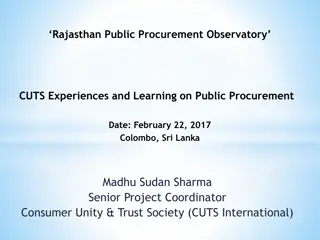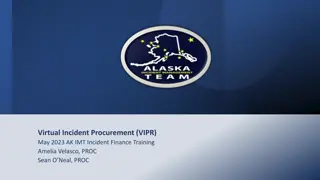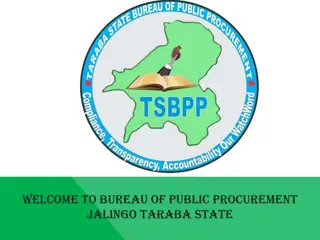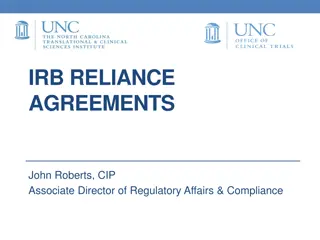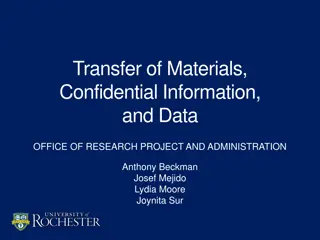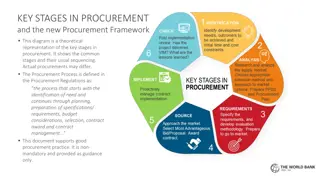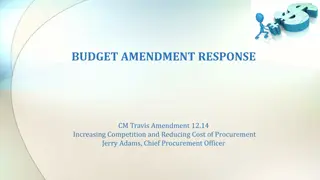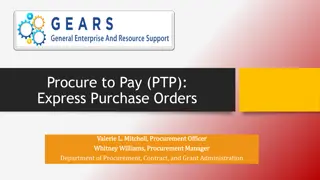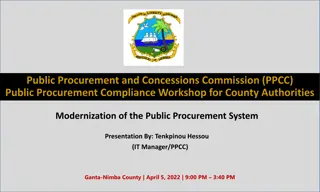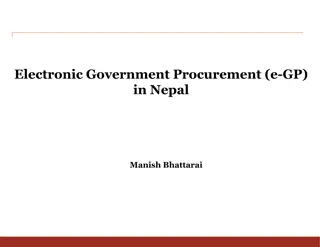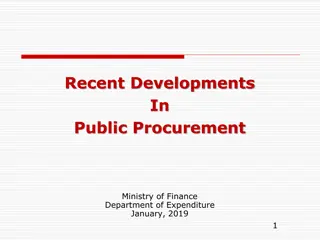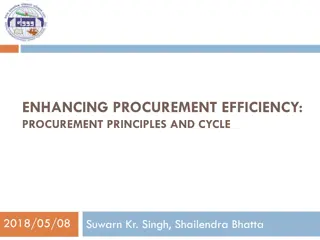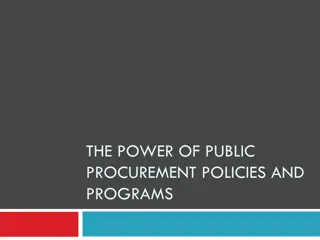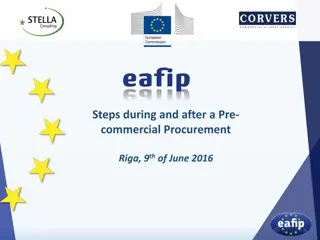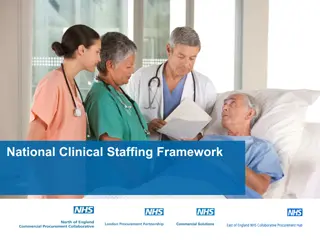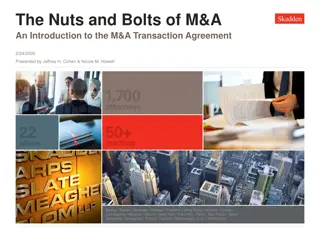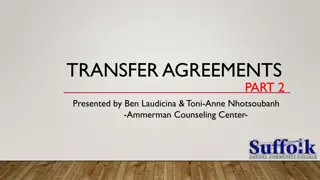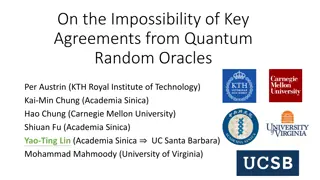Understanding Framework Agreements in Procurement
Framework agreements are contracts between procuring entities and selected suppliers or contractors. They are useful for recurring or urgent procurement needs. These agreements go through a two-stage procedure, involving selection of parties and awarding contracts. There are two types of framework agreements: closed and open. Different procurement methods, such as open tender, are used to conclude these agreements.
Download Presentation

Please find below an Image/Link to download the presentation.
The content on the website is provided AS IS for your information and personal use only. It may not be sold, licensed, or shared on other websites without obtaining consent from the author. Download presentation by click this link. If you encounter any issues during the download, it is possible that the publisher has removed the file from their server.
E N D
Presentation Transcript
Most Frequent Questions about Frameworks Agreements 19 January 2021
1. What does a framework agreement mean and when are framework agreements useful? Framework agreement is an agreement between the procuring entity and the selected supplier or suppliers) or contractor (or contractors) concluded upon completion of the first stage of the framework agreement procedure. Article 2 (e) (i) UNCITRAL Model Law on public procurement 2011 (UNCITRAL ML) A Framework agreement is applied in the following cases: The need for the subject matter of the procurement is expected to arise on an indefinite or repeated basis during a given period of time; or By virtue of the nature of the subject matter of the procurement, the need for that subject matter may arise on an urgent basis during a given period of time. Article 32 (1) UNCITRAl ML 15 July, 2024 2
2. What is the framework agreement procedure? Framework agreement procedure is a procedure conducted in two stages: Conclusion of framework agreement Selection of a supplier (or suppliers) or a contractor (or contractors) to be a party (or parties) to a framework agreement with a procuring entity and conclusion of a framework agreement 1 Stage Awarding a procurement contract under the framework agreement to a supplier or contractor party to the framework agreement. 2 Stage Article 2 (e) UNCITRAL ML 15 July, 2024 3
3. What are the types of framework agreements? A framework agreement to which no supplier or contractor that is not initially a party to the framework agreement may subsequently become a party CLOSED FRAMEWORK AGREEMENT A framework agreement to which a supplier (or suppliers) or a contractor (or contractors) in addition to the initial parties may subsequently become a party or parties OPEN FRAMEWORK AGREEMENT Minimum or maximum number of suppliers participating in FA can be established Article 2 (e) (ii)-(iii) UNCITRAL ML 15 July, 2024 4
4. What procurement methods are used to conclude a framework agreement (Stage 1)? The Framework Agreements (FAs) are concluded by: Open tender Other procurement methods Articles 58, 60 UNCITRAL ML 15 July, 2024 5
5. Who can be parties to the framework agreement? Procuring entity (PE) PE acting on behalf of several procuring entities Central Purchasing Body (CPB) One supplier (closed framework agreements) Multiple suppliers (open and closed framework agreements) 15 July, 2024 6
6. What are the terms for concluding a framework agreement? The UNCITRAL Model Law does not specify a specific time frame for the framework agreement. Article 33 (1) of the 2014 EU Directive on public procurement provides that the FA may not exceed 4 years; in exceptional cases it can. The recommended terms based on international practice are from2 to 4 years. 15 July, 2024 7
7. What is the procedure for conducting the 2nd stage of the framework agreement for concluding a procurement contract? WITH 2 STAGE OF THE COMPETITION WITHOUT THE 2 STAGE OF THE COMPETITION Within the framework of the closed FA, in which all the terms of the purchase are established at the conclusion of the FA, the 2nd stage of the tender is not required to conclude a procurement contract. The 2nd stage of the competition is a procedure within the framework of an open FA or a closed FA with more than one supplier or contractor in which certain procurement conditions that can not be established with sufficient accuracy at the conclusion of the FA should be established or clarified in within the framework of the second stage of the competition. The procurement contracts are concluded within the FA by holding the second stage of the competition among the suppliers who are participants in the FA. Procurement contracts are concluded directly with suppliers - the parties to the FA on the basis of the conditions set out in the FA. Various competitive procedures are used to conclude a procurement contract under a framework agreement (request for quotations, reverse auction, electronic catalogue, etc.) Parties can specify the conditions, but do not make significant changes to the conditions set out in the FA. 15 July, 2024 8
Other questions: What are the benefits of the framework agreements? What are the risks? Does public procurement legislation allow for framework agreements or should it be amended? How can the legislation and practice of framework agreements work well? These and other questions will be discussed with Caroline Nicholas and Gian Luigi Albano, the authors of the book Law and Economics framework agreements: Designing flexible solutions for public procurement 15 July, 2024 9
THANK YOU FOR ATTENTION! Yulia Shapovalova Counsel, Legal Transition Programme, shapovay@ebrd.com . +44 7557 759815 15 July, 2024 10


